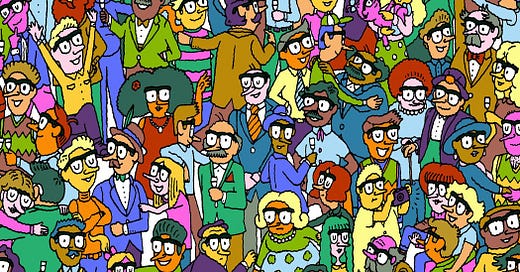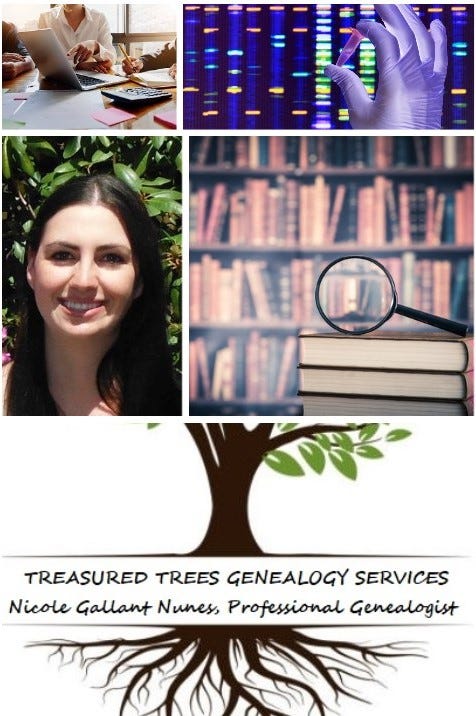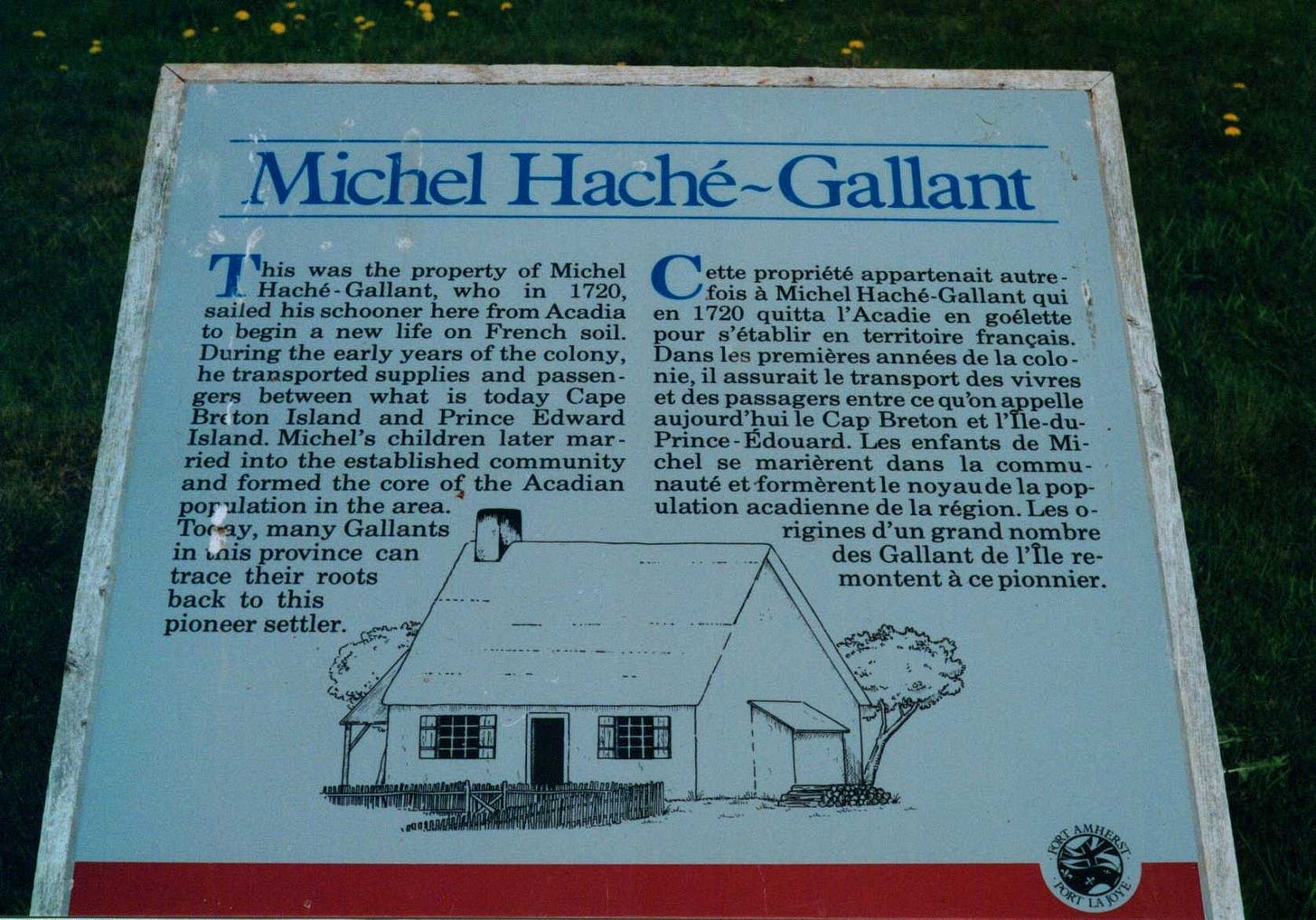Remember the children’s story Are You My Mother? (P.D. Eastman)? In it, a bird hatches while its mother is off her nest. The chick then wanders about among other animals, vehicles, and machinery until a steam shovel drops it back in its nest, and the mother bird returns with the hatchling’s first meal.
That would be the template for my own imagined Acadian story: Are You My Cousin?
I’d be the bespectacled, blond-haired guy who’s raising his arms because someone from the other side of the room blurted out a name that was in my family tree.
I did that once at a poetry reading. My now writing pal — and founding member of Acadiann — George Comeaux read a lilting poem in his soft southern drawl. When he finished, I said something in French. Which completely befuddled him because, by his generation, the Acadian was there only in English. (Through the years, we’ve identified our common founding ancestors as Pierre Comeau and Rose Bayon.)
When I try to figure out what cousin level we are, that’s when I run into the realization that I don’t have a family tree; I have a family thicket. We have so many lines and sidelines in common as to remind me of the song I am my own Grandpa.
By way of example, let’s say George and I are related 10 times in 10 different ways. Are we closer cousins than we think based on Pierre and Rose 12 generations ago?
At this point, I need professional help.
Fortunately, Nicole Gallant Nunes is there. She’s a professional genealogist who often wrestles with the Acadian Question.
Nicole: It's a constant game of "Hmm, are you really 4th cousins or do you just share a ton of ancestors further back making the DNA connection appear closer than it technically is?" Some of them are just impossible to figure out without solid paper trails because of all that redundant DNA we share with our matches many, many times over. It throws everything off!
I touched on endogamy and pedigree collapse briefly in my article about Michel Hache Gallant because I was getting so many questions about how we could still have a genetic tie to Michel all these generations later and it's absolutely because of endogamy.
Acadians in general will share like 75% of their ancestors with everyone else of Acadian descent. I'm not sure of the exact statistic, but you catch my drift. It's a ton (lol) and it just keeps getting reinfused and doesn't have a chance to 'die out'.
Acadiann: So much for the British guys who thought they’d destroy Acadia through assimilation and separation.
Nicole: Ha! They clearly underestimated the incredibly interwoven and resilient bloodlines of the Acadians.
When it comes to Acadians in particular, we will share many ancestors with each other, much more than the endogamy and pedigree collapse that is common in French Canadian lines. Quebec is endogamous for sure but Acadians are on a whole other level. We definitely are our own Grandpa (haha).
Genetically we are very similar and it tends to show in our DNA as we inherit many short chunks of DNA from our shared ancestors, more so than the longer stretches of DNA most people have. I tried chromosome mapping many times on Acadian DNA and it's just a mess to try to figure out what bits came from which ancestors because there are always so many in common.
This my own endogamy image for my paternal tree. You can see that paternal grandma (Quebecoise) represented by the pink dot has a lot more individual ancestors than my paternal grandfather (Acadian) represented by the blue dot. The endogamy is much more rampant on the Acadian side but is still very prevalent in French Quebec for sure.
It's incredibly common to descend from an ancestral couple several times. So far my record is descending from six children each by three different couples, one couple being Acadians Antoine Bourg and Antoinette Landry. I also descend from six children of Pierre Michaud and Marie Ancelin, and from Jean Pelletier and Anne Langlois in Quebec.
Acadiann: Then, I suppose, it’s not so odd that someone thought my brother looked like a Gallant after about 250 years post-Grand Dérangement (Digging in their Basement).
Nicole: I remember years ago I was trying to map out how many actual individual ancestors I had. You know, like how you are supposed to have 4,096 ancestors at 10x great-grandparent level? I had a minuscule fraction of that amount on my Acadian side. It was like 100 unique individuals at the 10x generation and that's just with one Acadian grandparent. Can you imagine the tangled web of someone fully Acadian or Quebecois? Whew!
Acadiann: Reminds me of something I heard recently at the American Canadian Genealogical Society virtual conference on DNA. Genealogist Debbie Wilson Smyth’s workshop was titled “DNA Doesn’t Lie, But It Needs Help to Find the Truth!” She told us that we have both a genealogical tree and a genetic tree, that the genetic one is a subset of the genealogical one.
I wonder when someone says there’s a “false match” because of endogamy, whether that’s factual but not true. It’s a matter of perspective, right? If I share more genetic material with a double 4th cousin than a second cousin, then we have a closer genetic tree right? Even though I have a closer genealogical tree with my second cousin?
Nicole: Exactly. It will vary from company to company but Ancestry in particular uses the Timber algorithm which is designed to disregard parts of our DNA that they believe is passed down from a common genetic group from the same area (like Acadians) versus it being a true match with that segment passed down from a shared ancestor. So when Ancestry removes those pieces that match because they don't think they are true matches, it's helpful for most people to eliminate that 'noise', but, we aren't completely sure how it affects populations that have a lot of proven endogamy because those removed pieces could actually be true matches for us, but possibly further back in our tree that may not be able to be discovered with paper trails.
Acadiann: So when I try to figure out what kind of cousin George and I are, or what kind of cousin you and I are, I can use paper documents to trace our genealogy, and DNA tests to trace our genes, and I might come up with different answers? And they’d both be true?
Nicole: Yes, both answers would be true despite the difference. Paper trail genealogy may show you that your closest shared ancestors are your great-great-grandparents, technically making you third cousins, but if you were to look at the shared DNA, you may show a closer relationship appearing as possible second cousins due to all that inherited DNA from earlier shared ancestors. This makes genetic genealogy tricky for people with endogamous roots. We are learning more about how to tackle these challenges as the field progresses but the possible inflation of shared centimorgans should always be considered when trying to piece a DNA match into your tree with known endogamy.
Acadiann: Perhaps a better model than Are You My Mother? would be Elizabeth Barrett Browning’s Sonnet 43, first line How Do I Love Thee? Let Me Count the Ways. For Acadians, it would be How Are You My Cousin? Let Me Count the Ways.
Nicole: This is so true! I have yet to meet another fellow Acadian or French Canadian that I do not share at least one ancestor with.
I believe that's what makes Acadians so amazing. We are so in touch with our history and we tend to treat everyone like family because, well, we are just one giant, extended family.
Resources
Strategies for Overcoming Endogamy Nicole Elder Dyer talks about Marie’s Acadian and French-Canadian lines to explore this concept
The genomic heritage of French Canadians For those with a science-geek bent. When it comes to medical genetics, so says the author, an Acadian is not interchangeable with someone from Montreal
Acadian Ancestors and Their DNA “When I first discovered my Acadian heritage, my now-deceased cousin Paul LeBlanc told me that if you’re related to one Acadian, you’re related to all Acadians. I thought he was being facetious, but when he sent me a list of 137 ways we were related, I quickly realized how intermarried this isolated group of people had been.” Roberta Estes
Genealogical vs. Genetic Family Trees
About those British guys - Patrick LaCroix’s series on Acadia under British rule
https://querythepast.com/british-acadia-beginnings/
https://querythepast.com/british-acadia-french-neutrals/
https://querythepast.com/british-acadia-unraveled-deportation/









Now I know the word for what I have been describing to my children, which I just called "double cousins" because my brother-in-law's grandmother was a Nova Scotian Comeau, to go with my own X factor from Louisiana sources.
Then -- Shazam! -- my brother told me his son did an A24 genealogy test and discovered his great (don't know how many levels up) paternal grandfather (my line) Carmouche and maternal grandfather (Adams line) are THE SAME PERSON! Maybe not uncommon?
Very interesting Ann! :)